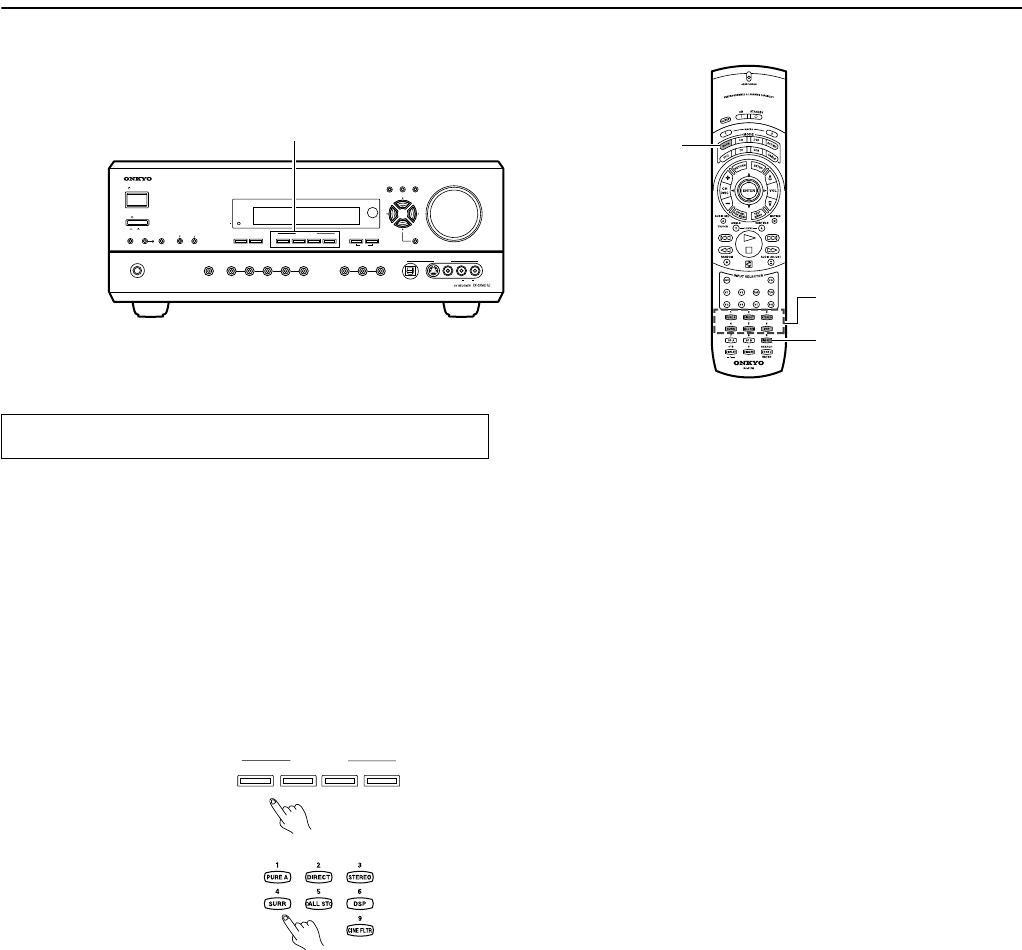
50
Listening Modes
STANDBY/ON
PHONES
REC OUT ZONE 2
OFF
VIDEO 4
INPUT
DIGITAL
VIDEO 3
TAPE
TUNER
VIDEO
4
SURROUND
DSPSTEREO
DISPLAY
MEMORY
DIRECT
VIDEO 2
DVD
VIDEO
1
AUDIO
SELECTOR
CLEAR
FM MODE
LISTENING MODE
TUNI
NG
PRESET
MASTER VOLUME
RETURN
ENTER
AUDIO
ADJUST
SETUP
OFF
ON
POWER
RT/PTY/ TP
VCR 2VCR 1
LEVEL
S VIDEO
VIDEO
AUDIO
LR
STANDBY
C
D
CINE FLTR
RCVR
MODE
Listening mode buttons
Listening mode
buttons
TX-SR601/601E
• Refer to pages 46, 47 for more details of listening modes.
• Refer to page 54 for sources and listening modes.
• When playing Dolby Digital or DTS software, the listening
mode will automatically change to Dolby Digital or DTS.
Tip:
You can set in advance a different listening mode for each input
source. For more details, see page 54 .
When using the remote controller, first press the RCVR
MODE button before preceding to the step below.
Press one of the listening mode buttons to select the listening mode.
DIRECT: Changes the listening mode for the signal type that is
currently being input from the selected input source to the Direct
listening mode. If pressed, the corresponding settings in the “Input
Setup” menu for the selected input source is also changed (see page
54).
STEREO: Changes the listening mode for the signal type that is
currently being input from the selected input source to the Stereo
listening mode. If pressed, the corresponding settings in the “Input
Setup” menu for the selected input source is also changed (see page
54).
SURROUND (SURR): Changes the listening mode for the signal
type that is currently being input from the selected input source to
the surround mode that matches the signal type (e.g., Dolby Pro
Logic II, Dolby Digital, DTS, or DTS Neo:6). If pressed, the
corresponding settings in the “Input Setup” menu for the selected
input source is also changed (see page 54).
Selecting a listening mode (TX-SR601/601E)
STEREO SURROUND DSP
DIRECT
LISTENING MODE
TX-SR601/601E
Remote controller
If the SURROUND button is pressed
• While playing back DTS sources
Each time you press the button, the DTS-ES setting switches
from: Auto → On → Off.
Auto: When a DTS source with a DTS-ES flag (ID signal for
DTS-ES) is input, the listening mode changes automatically to
DTS-ES Discrete 6.1 or DTS-ES Matrix 6.1. If the DTS source
has no DTS-ES flag, the source is played in DTS mode.
On: When a DTS source with a DTS-ES flag is input, the
listening mode changes automatically to DTS-ES Discrete 6.1
or DTS-ES Matrix 6.1. If the DTS source has no DTS-ES flag,
the source is played in DTS-ES Matrix 6.1.
Off: DTS sources are always played in the DTS mode. The
DTS-ES modes are not used even when the DTS source has the
DTS-ES flag.
• While playing back Dolby Digital (Multichannel) sources
Select whether or not to play back Dolby Digital sources using
the matrix 6.1-channel decoder when using surround back
speakers.
Each time you press the button, the Dolby Digital EX setting
switches from: Auto → On → Off.
Auto: Sources with an EX flag (ID signal for Dolby Digital) are
automatically played back in Dolby Digital EX. If the source
has no EX flag, the source is played back in Dolby Digital.
On: When a Dolby Digital source with an EX flag is input, the
listening mode changes automatically to Dolby Digital EX. If
the Dolby Digital source has no EX flag, the source is played in
the Dolby Digital EX.
Off: Dolby Digital EX playback is not performed even if an EX
flag exists. (Playback is the normal Dolby Digital playback.)
Be aware that if the surround channel is monaural or there is no
surround channel, the source is played back in Dolby Digital
regardless of this setting.
• While playing back Analog/PCM sources or Dolby Digital 2-
channel sources
Each time you press the button, the Dolby Digital setting
switches from: Pro Logic II Movie → Pro Logic II Music →
DTS Neo6:Cinema → DTS Neo6:Music.
If “None” is selected for the surround speaker setting in the
“Speaker Config” menu, DTS Neo:6 Music will not appear.
ALL ST (remote controller only): Changes the listening mode for
the signal type that is currently being input from the selected input
source to the All Ch Stereo listening mode. If pressed, the
corresponding settings in the “Input Setup” menu for the selected
input source is also changed (see page 54).


















